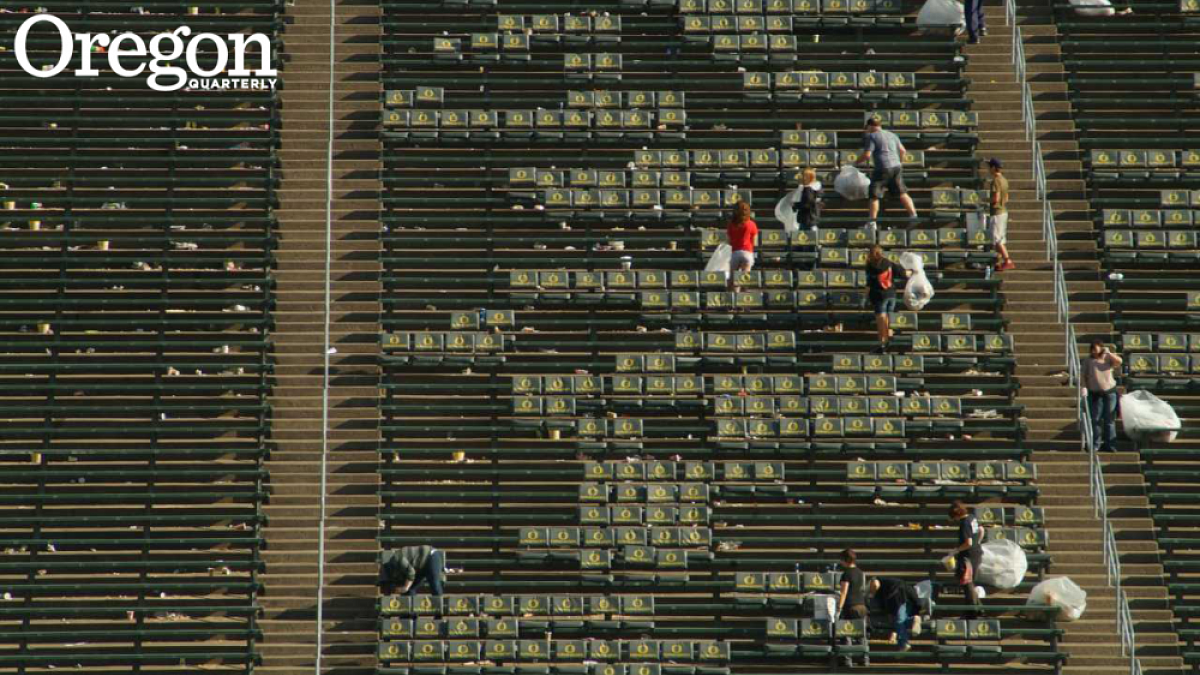Saturday, September 17, 7:30 a.m. The sun is barely up over Autzen Stadium. Kickoff for today’s game against Missouri State is scheduled for 12:30 p.m. But another game is already well under way.
Steve Green, the athletics department’s maintenance and labor coordinator (you might say he’s the Chip Kelly of cleanup), zooms around on a golf cart. He’s been with the department for twenty-one years and has been overseeing stadium cleanup for the past seventeen years.
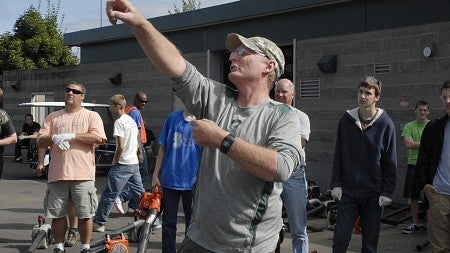
During football season, the facilities crew is in constant prep mode. Game day work had begun on Friday morning, when about fifty men and women from the UO’s Army ROTC program ran from campus, wiped down all the seats in the stadium, and ran back across the river. In doing this, they raise money for adventure training, while junior members of the battalion develop leadership skills, coordinating the group, strategizing ways to make the process more efficient.
A group of thirty parents and students from A3 charter school in Springfield operates the “Beverage Recovery System.” Wearing plastic gloves and all manner of Ducks gear, they’ll be stationed by the recycle bins with gopher grabbers (long-handled “claws” that let them pick up bottles and cans without touching them), encouraging fans to drain their drinks into buckets (the stew will later be flushed down a sanitary line) and to place their empties in the appropriate receptacles.
At a pay rate of $650 per game, the work represents the bulk of A3’s fundraising effort. “We made $3,600 last season,” says Lonni Sexton, who works full-time at Knight Library and has led the A3 group for many years. “We get to watch the game. We help people recycle.”
Green assigns every group one job for the entire season. The North Eugene boys’ soccer team and girls’ dance team keep the bathrooms neat. The Willamette High School boys’ soccer team is the go-to group for on-the-spot cleanups and “general running around.” The Thurston cheer team is in the Moshofsky Center, monitoring garbage, clearing tables, and encouraging composting; tomorrow, they’ll be on cleanup.
By the end of the day Sunday, about twenty groups with more than 350 community members will have taken part.
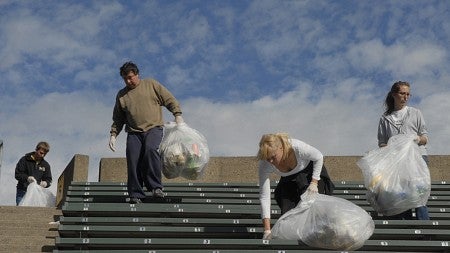
“This is more straightforward,” Sexton says. “We show up at Autzen with a group of people, we work a few hours, and we get paid.”
North Eugene soccer coach Salvador Barajas ’00 notes that with budget cuts in the school districts, teams are strapped. Uniforms, shoes, and travel to games, plus the physical exams required for play are already out of reach for many players. “Some of these kids otherwise would never have a chance to come to Autzen,” he adds. “It’s good for them to be part of the community, and it enables them to play.”
It’s a win-win, Green says: the athletics department would pay private contractors a lot more to do any of these jobs.
While recycling began at Autzen at the time of the 2002 expansion, it’s only the second week of a pilot program between the athletics department and Oregon Beverage Recycling Cooperative (OBRC) to have student groups collect returnables from the tailgate lot. April Hovas, ORBC’s senior relationship manager, notes that eighty-five pounds of aluminum and fifty cases of glass were redeemed after the Ducks home opener against Nevada.
When school is in session, the job (and the nickel per container) will belong to students from the Climate Justice League at the UO, but today a small but determined group—five adults and a little boy about eight—from Our Father’s House, a church in Springfield, and a group called Celebrate Recovery, is charged with the task.
A sustainability committee was formed in the UO athletics department in summer 2010 and is cochaired by Bob Beals, associate athletics director of operations and events. In addition to evaluating practices throughout the department, one of its goals is to reduce waste and increase recycling at the games.
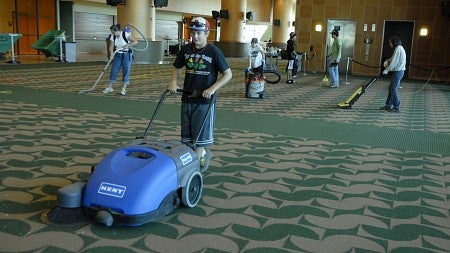
About an hour to kickoff, the band and cheerleaders are pumping up the pregame crowd in PK Park. Springfield resident Carl Buchanan laughs when asked to consider the cleanup. “It’d be phenomenal, wouldn’t it? This many people . . . I imagine they’ll find stuff everywhere.” Kay Schoeler of Klamath Falls thinks it’d be “horrific.” Eleven-year-old Maddie from Bend mulls it over. “It’s gotta be really messy, and it would take a lot of hard work.” Other Ducks fans characterize the job of cleaning up of as “crappy,” “extensive,” “intense,” “time-consuming,” “a Herculean task.”
“I definitely would not want that job.”
Green says he doesn’t worry about the immensity of the task. “As long as everyone does their part, it works.” He and his staff hustle about during the game, always available by radio. But for them, the game is the eye of the hurricane.
The Ducks soundly defeat Missouri State, 56–7. After any one of the eight UO touchdowns, you can hear the roar a mile away in south Eugene; 58,847 Duck fans make a lot of noise. And a lot of mess. Sunday will be, as Green and Beals describe it, an “all out war.”
* * *
Sunday morning, 7:00 a.m. It’s quiet. A dozen or so Boy Scouts from Troop 100 make their way through the empty parking lot picking up trash. White tailgating tents still stand, but nobody is inside.
In the Moshofsky Center, the chairs and tables are gone. The Thurston cheerleading squad is back. In a line, they’ll walk the 110,000-square-foot floor with large push brooms, sweeping up every speck of debris left by a tailgate party for 5,000 people. “Any time I can get the kids on campus, thinking about college, it’s a good thing,” says coach James Underwood. “And it’s good for them to work and see a tangible reward.” The reward, for his team, is competition fees, uniforms, and bus transportation to games.
Sixteen-year-old Haley Randall, a junior at Thurston who would like to attend the UO, says sweeping for two hours straight is hard work, but it’s fun spending time as a team. At 8:00 a.m., she says, Moshofsky was “a total mess. Garbage everywhere, those newspaper things, pompom shreddings, food, messy stuff, nasty stuff. How are people so messy? But we’re getting paid for this, so it’s all good.”
Facilities employee Robert McCoy is supervising the cleanup. When it’s finished, he’ll oversee the dismantling of eighty-four rolls of PortaFloor and about thirty squares of Visqueen that cover the practice turf. It’ll be put away until the next home game.
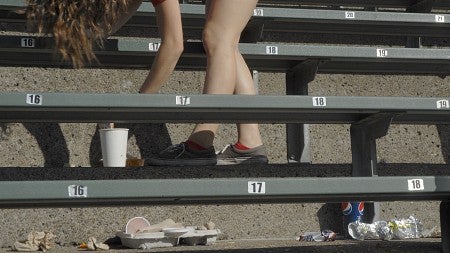
The North Eugene girls’ soccer team picks up trash on the river bike path and in Alton Baker Park. Troop 100 cleans the parking lot, PK Park, and the perimeter of the stadium. For this task, they’ll earn about $1,400, minus their own costs for insurance, says Katrina Sugar, parent organizer for the group.
In small groups, members of the Webfoot Juniors volleyball club, a regional club run by former UO volleyball coach Cathy Nelson, sweep, pick up trash, scrub the toilets, sinks, and mirrors in Autzen’s fourteen sets of public restrooms (eleven inside, three outside) and the visiting team’s locker room—and then the dads in the group come through and sanitize everything. Their goal is to complete the entire job in about two hours.
“When the kids think too much about this job, it grosses them out,” says a parent. “But they usually have a good time.” The job is a way for girls to help pay for their fees and other expenses, which can reach almost $4,000 for elite players, she says.
“Volleyball is such a team-oriented sport,” she says. “So is scrubbing toilets with your friends.”
Facilities employee Jesse Bendix is supervising the bathroom crew today. “I don’t think there is a short straw here,” he says. “It’s all about the parents and the kids, and everyone’s happy to be here.”
Even Mike Simons, head coach of Thurston High School’s wrestling team, is smiling as he picks up popcorn containers, water bottles, and discarded Game Day newspapers. The team is responsible for one-third of the stadium bowl. Simons was a wrestler for Oregon State. “I grew up rooting against the Ducks,” he says, “and now I have to pick up their garbage.”
Ami Wick, drum major for the Thurston marching band, is motivating her team on the other side of the bowl. Her group of twenty-eight will average about six bags of garbage each. “There’s a lot more we can recycle, which is great,” she adds. “But this reminds me never to throw trash on the ground.”
More than seventy members of the River Road Swim Club, home to North Eugene High School’s water polo and swim teams, will walk through the stands with leaf blowers to finish the cleanup. They recently unveiled a $25,000 scoreboard—paid for with money earned working for the athletics department.
At $1,800 per cleanup, this is one of the better paying jobs—but it requires more skill and personnel. Green leads them in a huddle. Everyone must wear eye protection and earplugs. He admonishes the kids that “the leaf blowers aren’t toys.” “Gas Dads” will be stationed around the area and will keep the group moving. “Looks like we’re a little short-handed today,” Green says. “We’re going to have to work hard and fast. I don’t have a problem sending you back to do it over.” Green doesn’t have to settle for mediocrity—there’s a long waiting list of people who would like the job.
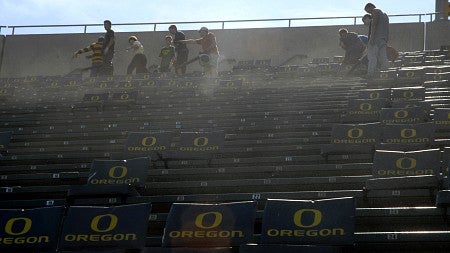
Scout Troop 260 has managed the cleaning of the concourse and driveways of Autzen—working in concert with the street sweeper from Mid-State Industrial Services—since 2001. Laura Lahey restocks garbage bags and refuels the troop’s leaf blowers with gasoline. She says: “People say, ‘you pick up garbage at Autzen . . . and that’s fun?’”
It is fun. “The best part of this job is that it’s always different. You never know what to expect, so you’re prepared for anything,” says Green. “That, and working with people. I get to work with the same groups for years and years, so I see kids grow up, families develop. It’s very cool.
“There are a lot of parents who would rather write a check,” he says, “and there are those who can’t. This is great for those who can’t.”
By 1:00 p.m., the parking lot by the Moshofsky Center is full again. The Ducks football players are back, reviewing video of Saturday’s game and prepping for the next one.
On Monday, Green will come into work and process payroll for the more than twenty different service groups. Local waste disposal company Sanipac will come and haul away 17.7 tons of garbage, 11 tons of recycling, and 400 pounds of compost.
It’s like the party never happened
—By Zanne Miller
Zanne Miller, MS ’97, is a project manager at the UO School of Journalism and Communication.


